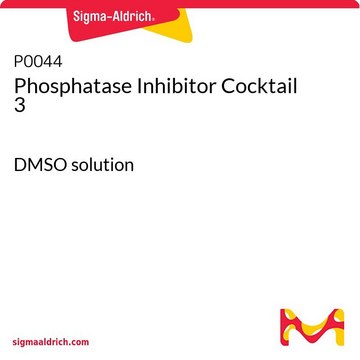I3786
Protease Inhibitor Cocktail
Animal-Free, DMSO solution, for the inhibition of serine, cysteine, aspartic proteases and aminopeptidases, for use with mammalian cell and tissue extract, DMSO solution
Synonym(s):
Protease inhibitor
About This Item
Recommended Products
product name
Protease Inhibitor Cocktail, Animal Component Free, for use with mammalian cell and tissue extract, DMSO solution
Quality Level
form
DMSO solution
storage temp.
−20°C
Looking for similar products? Visit Product Comparison Guide
General description
Specificity
Application
Components
Aprotinin
Bestatin
E-64
Leupeptin
Pepstatin A
Physical form
Signal Word
Warning
Hazard Statements
Precautionary Statements
Hazard Classifications
Eye Irrit. 2 - Skin Irrit. 2
Storage Class Code
10 - Combustible liquids
WGK
WGK 2
Flash Point(F)
188.6 °F - closed cup
Flash Point(C)
87 °C - closed cup
Certificates of Analysis (COA)
Search for Certificates of Analysis (COA) by entering the products Lot/Batch Number. Lot and Batch Numbers can be found on a product’s label following the words ‘Lot’ or ‘Batch’.
Already Own This Product?
Find documentation for the products that you have recently purchased in the Document Library.
Customers Also Viewed
Our team of scientists has experience in all areas of research including Life Science, Material Science, Chemical Synthesis, Chromatography, Analytical and many others.
Contact Technical Service
















